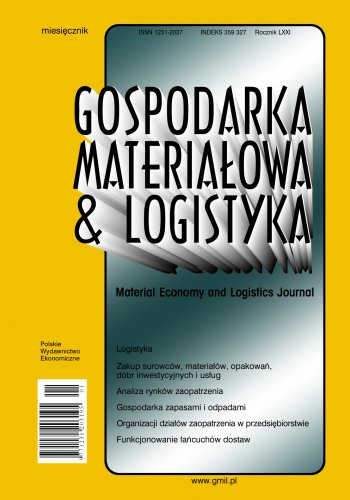The ecobalance analysis of the Retriev recycling technology of used car Lithium-Ion batteries
The article presents selected technologies for recycling Lithium-Ion batteries (LIBs), later referred to as Li-Ion, used as a power source in hybrid and electric cars. Utilization of the disused Li-Ion, in accordance with the environmental protection principles, allows to recover a number of materials and compounds, including lithium, cobalt and others. The paper also presents the results of an eco-balance analysis of the hydrometallurgical recycling process of the disused Lithium-Ion batteries. The analysis was carried out using the IMPACT2002+ method. The results are given in environmental points, whose positive value means environmental damage, the negative result is an environmental benefit. The results of the analysis are given for the categories specific for the IMPACT2002+ method. These are: human health, ecosystem quality, climate change and resource consumption. The aim of the article is to estimate the potential environmental burdens characteristic for the Lithium-Ion battery recycling technology using the requirements of the ecological Life Cycle Assessment.
References
Bibliografia/References
Bakierska, M., Chojnacka, A. (2016). Akumulatory litowe jako współczesne systemy magazynowania energii. Wiadomości Chemiczne, (68), 855–871.
Boyden, A. (2014). The environmental impacts of recycling portable lithium-ion batteries. Australian National University, Department of Engineering.
Cusenza, M. A., Bobba, S., Ardente, F. Cellura M., Di Persio F. (2019). Energy and environmental assessment of a traction lithium-ion battery pack for plug-in hybrid electric vehicles. Journal of Clean Production, 215, 634–649.
Dyrekcja Generalna ds. Polityki Wewnętrznej, Departament Tematyczny ds. Polityki Strukturalnej i Polityki Spójności (2018). Badanie dla Komisji Transportu i Turystyki — Samochody elektryczne o napędzie bateryjnym: rozwój rynku i emisje w całym cyklu życia. https://www.europarl.europa.eu/RegData/etudes/STUD/2018/617457/IPOL_STU(2018)617457_PL.pdf (27.10.2020).
Engel, J. (2016). Development perspectives of Lithium-Ion recycling processes for electric vehicle batteries. Open Access Master's Theses. Paper 905.
Gaines, L. (2014). The Future of Automobile Battery Recycling: Charting a sustainable course. Sustainable Materials and Technologies, 1, 2–7.
Górzyński, J. (2007). Podstawy analizy środowiskowej wyrobów i obiektów. Warszawa: Wydawnictwa Naukowo-Techniczne.
Janas, P. (2019). Firmy ratują sprzedaż aut elektrycznych. https://www.samar.pl/__/3/3.a/104111/3.sc/11/Firmy-ratują-sprzedaż-autelektrycznych-.html?locale=pl (27.10.2020).
Jaworowska, M. (2017). Akumulatory Li-Ion — czy zabraknie materiałów do ich budowy? https://elektronikab2b.pl/biznes/33923-akumulatory-li-ion-czy-zabraknie-materialow-do-ich-budowy (27.10.2020).
Kamińska, E., Merkisz, J., Kamiński, T. (2013). Wykorzystanie metody LCA do szacowania poziomu obciążeń środowiska związanych z odzyskiem ołowiu z surowców wtórnych. Chemik, 67(10), 963–970.
Komisja Europejska (2015). Komunikat Komisji do Parlamentu Europejskiego, Rady, Europejskiego komitetu ekonomiczno-społecznego i komitetu regionów. Zamknięcie obiegu — plan działania UE dotyczący gospodarki o obiegu zamkniętym COM/2015/0614 final. https://eur-lex.europa.eu/resource.html?uri=cellar:8a8ef5e8-99a0-11e5-b3b7-01aa75ed71a1.0019.02/DOC_1&format=PDF (27.10.2020).
Mayyas, A., Steward, D., Mann, M. (2018). The case for recycling: Overview and challenges in the material supply chain for automotive li-ion batteries. Sustainable Materials and Technologies, 19. https://doi.org/10.1016/j.susmat.2018.e00087.
Molenda, J. (2018). Akumulatory Li-ion i Na-ion strategią rozwoju polskiej gospodarki. Biuletyn AGH, (126–127), 4–11.
Nordelöf, A., Poulikkiddou, S., Chordia, M., Bitencourt de Oliveira, Tivander, J., Arvidsson, R. (2019). Methodological approaches to end-of-life modeling in Life Cycle Assessments of Lithium-Ion batteries. Batteries, 5(3), 51. https://doi.org/10.3390/batteries5030051
Polski Komitet Normalizacyjny (2009a). Norma PN-EN ISO 14040:2009. Zarządzanie środowiskowe. Ocena cyklu życia. Zasady i struktura. Warszawa.
Polski Komitet Normalizacyjny (2009b). Norma ISO PN-EN ISO 14044:2009. Zarządzanie środowiskowe. Ocena cyklu życia. Wymagania i wytyczne. Warszawa.
Potempa, M., Lewandowski, D., Mikłasz, W., Gawliczek, M. (2017). Recykling akumulatorów Li-Ion. W: M. Bogacka, K., Pikoń (red.), Współczesne problemy energetyki IV, 63–72, Gliwice: Politechnika Śląska.
Sonoc, A., Jeswiet, J, Soo, K. V. (2015). Opportunities to improve recycling of automotive lithum-ion batteries. Procedia CIRP, 29, 752–757.
Stefanowicz, J. A. (2014). Strategia surowcowa w strategiach zintegrowanych ŚSRK i KPZ 2030 — obszary funkcjonalne i złoża strategiczne. Materiały z XXVIII Konferencji z cyklu Zagadnienia surowców energetycznych i energii w gospodarce krajowej. Zakopane 12–15.10.2014, 63–79.
Sun, X., Luo, X., Zhang, Z., Meng, F., Yang, J. (2020). Life cycle assessment of lithium nickel cobalt manganese oxide (NCM) batteries for electric passenger vehicles. Journal of Cleaner Production, 273. https://doi.org/10.1016/j.jclepro.2020.123006
Wójcik, M., Pawłowska, B., Stachowicz F. (2017). Przegląd technologii recyklingu zużytych akumulatorów litowo-jonowych. Zeszyty Naukowe Politechniki Rzeszowskiej. Mechanika, 295(89), 107–120.
Yu, Y., Chen, B., Huang, K. (2014). Environmental impact assessment and end-of-life treatment policy analysis for Li-Ion batteries and Ni-MH batteries. International Journal of Environmental Research and Public Health, 11(3), 3105–3198.
Zeng, X., Li, J., Singh, N. (2014). Recycling of spent lithium-ion battery: a critical review. Critical Reviews in Environmental Science and Technology, (44), 1129–1165.
Strony internetowe/Websites
https://leonardo-energy.pl/potencjal-recyklingu-baterii/ (27.10.2020)
http://knurow.solidarnoscgornicza.org.pl/2018/03/09/szokujacy-raport-samochody-elektryczne-nie-sa-ekologiczne/ (27.10.2020)


 Our website uses cookies in order to, among others, collect statistical data and ensure proper functioning of the site. Further use of the website without changing settings in your browser means that cookies will be saved in your device. Please note that you can always change these settings.
Our website uses cookies in order to, among others, collect statistical data and ensure proper functioning of the site. Further use of the website without changing settings in your browser means that cookies will be saved in your device. Please note that you can always change these settings.